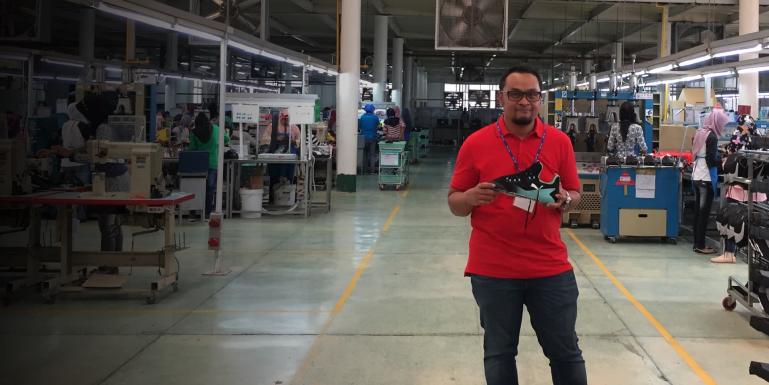Story of an Auditer

STORY OF AN AUDITOR
Helping maintain top working conditions in our Asian supplier factories is his daily business: Farid Nurjaman is a PUMA Auditor dealing with arising non-compliance issues.
“MOST OF THE ISSUES WE FIND DURING AUDITS AT OUR SUPPLIER FACTORIES ARE HEALTH & SAFETY ISSUES.”
says Farid Nurjaman
He monitors whether supplier factories maintain the social and working standards PUMA requires from a manufacturing facility. “For example, the fire extinguisher is blocked by something and isn’t visible. That’s pretty common,” adds Farid.
The Indonesian native is responsible for monitoring 35 PUMA supplier factories in South East Asia; he mainly works in Indonesia, Thailand, Malaysia, Philippines and Pakistan. As an auditor, it’s his job to check that manufacturers strictly adhere to the PUMA Code of Conduct.This is binding for suppliers and an essential part of our business contract with them. Amongst other things, the PUMA Code of Conduct specifies the minimum working age of factory employees, the payment of a specific minimum wage, the maximum number of working hours, and overtime payments.
The PUMA Sustainability Team takes the field with 21 employees mainly based in Asia. They are responsible for the social and environmental monitoring of our supplier factories. In 2017, they carried out a total of 408 audits.
“THROUGH OUR AUDITS, THE CONDITIONS FOR THE WORKERS IN OUR SUPPLIER FACTORIES HAVE SIGNIFICANTLY IMPROVED OVER THE YEARS.”
“Normally, the more a factory is audited, the more they understand local regulations and our Code of Conduct. Most of our factories have been working for PUMA for a long time and they know the best way to comply with our requirements.”
Auditing a factory of the size of 2,000 workers usually takes Farid two days. He starts the process with a meeting with the factory management to explain the audit scope to them. He then goes on a factory tour, checking out the work places and dormitories of the workers, the canteens, work contracts and salary files. Personal talks with some of the workers are also part of his schedule. This helps him find out how they are treated and how they feel. “By the end of the audit, I usually have a closing meeting with the factory management to inform them of the issues we came across and what they have to do to rectify them.”
After the audit, Farid usually gives the factory management a week to take corrective actions on issues not in accordance with PUMA standards. “At least once a year, we go to visit them again and check it out.” For core factories, the visit can occur up to four times a year. This is to ensure that all findings classified as “Critical Issues” are closed by the end of the year.
The issues he stumbles upon and digs out differ from country to country. While he mostly deals with work safety topics like fire safety in Pakistan, it is the temporary contract issues in Indonesia that are a concern. While PUMA supplier factories pay their workers at least the country’s legal minimum wage, non-governmental organizations are demanding a living wage.“
”HERE AT PUMA, WE ARE ALREADY RUNNING PROJECTS THAT AIM TO FURTHER IMPROVE THE WORKERS’ WAGES.”
Farid adds.
“It is not necessarily a living wage of a Western magnitude, but still an improvement.” Farid has quite some experience in improving people’s wage situation. A factory in Indonesia did not pay the full 13-month salary required by regulation. “I managed to convince the factory executives to increase the 13th salary and pay even more allowances. The workers then got talking with workers from other factories and found out that they were being paid more money than the others. The next time I visited the factory, they thanked me for making the management implement these changes. This felt really good to hear.”
Right now, Farid is most likely on a plane again, off to another audit in Southeast Asia to work relentlessly on PUMA’s goal: “We want to have sustainable factories around the world, so we don’t have to worry about compliance violations anymore.”
Maybe PUMA is not too far from this goal. Some time ago, Germany’s international broadcaster Deutsche Welle cited a trade union leader praising PUMA in Turkey. “They regularly monitor the working conditions, and also inspect whether workers are unionized, how much they are paid and the employer-employee relations. As a result, there has been an increasing pressure on employers, and the situation is improving.”